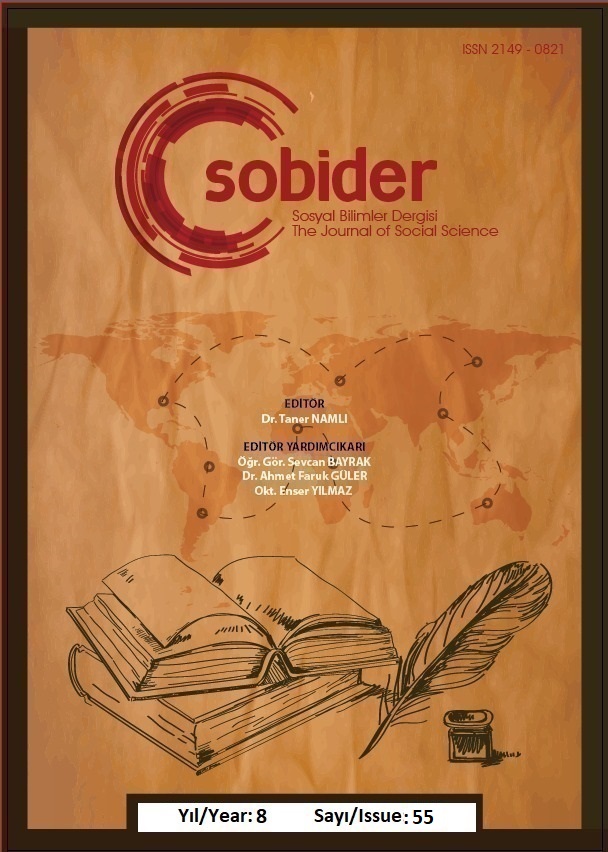Author :
Abstract
Türk dili, tarihten günümüze çok geniş bir coğrafyaya yayılmış ve konuşulmaktadır. Tarihi, coğrafi, siyasi vb. şartlar sebebiyle Türk lehçelerinin söz varlığı arasında fonolojik, morfolojik ve semantik farklılıklar oluşmuştur. Fakat en uzak görünen Türk lehçeleri arasında dahi ciddi anlamda ortaklıklar olduğu görülmektedir. Bu bağlamda Oğuz grubu lehçelerinden olan Türkiye Türkçesinin ve Güney Sibirya Türk lehçelerinden birisi olan Tuva Türkçesinin ortaklaşan söz varlığı bu çalışmada ele alınmıştır. Türkiye Türkçesinin ağızlarının Türk diline ait arkaik unsurları barındırması ve zengin bir söz hazinesi ihtiva etmesi sebebiyle mukayesede ağızlar tercih edilmiştir. Türkiye Türkçesinin standart yazı ve konuşma dilinde kullanılmayan pek çok sözün ağızlarda yaşamaya devam ettiği görülmektedir. Ağızlar bünyesinde Moğolca, Farsça, Arapça gibi dillere ait pek çok unsuru da barındırmaktadır. Karşılaştırmada Tuva Türkçesi için sözlükler, ağızlar için Türk Dil Kurumu’nun Derleme Sözlüğü verileri kullanılmıştır. Çalışmada Türkiye Türkçesinin standart yazı dilinde bulunmayan ağızlarda ve Tuva Türkçesinde bulunan ortak söz varlığının tespiti amaçlanmaktadır. Bu bağlamda tespit edilen 30 sözcüğün Tuva Türkçesindeki ve Anadolu ağızlarındaki durumu gösterilmiş ve ağızlarda konuşulduğu bölgeler de sözcüğün yayılımını göstermek amacıyla verilmiştir. Ayrıca bu sözlerin köken bilgisi açısından durumuna da bakılmıştır.
Keywords
Abstract
The Turkish language has spread and is spoken in a very wide geography from history to the present day. Historical, geographical, political, etc. dec polish to the circumstances, phonological, morphological and semantic differences have been formed between the lexical entities of the Turkic dialects. Dec polishing is observed that there are serious partnerships even among the most remote-seeming Turkic dialects. Turkish Polish Turkish Polish is one of the dialects of the Oguz group, and Tuvan Turkish is one of the dialects of the South Siberian Turkic language. Because the mouths of the Turkish language of Turkey contain archaic elements of the Turkish language and contain a rich vocabulary, mouths have been preferred in comparison. It seems that many words that are not used in the standard written and spoken language of Turkey Turkish continue to live in mouths. Mongolian Arabic, Persian and many other elements of the language are also found in the mouths. In the comparison, dictionaries for Tuvan Turkish and Compilation Dictionary data of the Turkish Language Institution for mouths were used. Turkish is a language that is not found in the standard written language of the Turkic language and it is aimed to determine the presence of common words found in Tuvan Turkish in the study. In this context, the status of the 30 words identified in the Tuvan Turkish and Anatolian mouths was shown, and the regions where they were spoken in the mouths were also given to show the spread of the word. In addition, the status of these words in terms of origin information was also looked at.
Keywords
- Aksan, D. (2015). Türkçenin Sözvarlığı. Ankara: Bilgi Yayınevi.
- Arıkoğlu, E. (2007). Tuva Türkçesi. Türk Lehçeleri Grameri, (Ed. Ahmet Bican Ercilasun), Ankara: Akçağ Yayınları, 1149-1228.
- Ata, A. (2000). Derleme Sözlüğü'nde Geçen En Eski Türkçe Kelimeler. Türkoloji Dergisi 13/1 s.67-77.
- Clauson, Sir Gerard (1972) An Etymological Dictionary of Pre-Thirteenthcentury Turkish, Oxford: Oxford Universty Press [ED].
- Derleme Sözlüğü I-XII (1981). Ankara: Türk Dil Kurumu Yayınları [DS].
- Doerfer, G. (1965). Türkische und mongolische Elemente im Neupersischen Band II. Wiesbaden [TMEN II].
- Eren, H. (1962). Anadolu'da Kafkasya Türkleri. Türk Dili Araştırmaları Yıllığı - Belleten , 9 , 319-357
- Eren, H. (2020). Eren Türk Dilinin Etimolojik Sözlüğü. Hazırlayan: Şükrü Haluk Akalın, Ankara: Türk Dil Kurumu Yayınları.
- Ertekinoğlu, S. (2017). “Yılbız” Sözcüğü Üzerine. Karadeniz. Karadeniz Uluslararası Bilimsel Dergisi 34 : 99-108.
- Killi Yılmaz, G. (2010). Kuzey ve Gündeydoğu Sibirya Türklerinin Dil Durumu. Ankara: Kök Sosyal ve Stratejik Araştırmalar Yayınları.
- Lessing, Ferdinand D., (2003). Moğolca-Türkçe Sözlük 1-2, (Çeviren: Günay Karaağaç).
- Ölmez, M. (2007). Tuwinischer Wortschatz, Tuvacanın Sözvarlığı Eski Türkçe ve Moğolca Denkleriyle. Wiesbaden: Harrassowıtz Verlag [TW].
- Schönig, C. (2000). Mongolische Lehnwörter im Westoghusischen, Wiesbaden.
- Sertkaya, O. F. (2012). Tagar ve Tagarçık Kelimeleri Hakkında veya Torba ve Torbalamak Üzerine Yeni Açıklamalar. Türk Dili Dergisi : 84-90.
- Tarama Sözlüğü (1996). XIII. Yüzyıldan Beri Türkiye Türkçesiyle Yazılmış Kitaplardan Toplanan Tanıklarıyla, Ankara: Türk Dil Kurumu Yayınları [TS].
- Tatarintsev, B. İ. (2000). Etimologiçeskiy slovar’ Tuvinskogo Yazıka Tom I. Novosbirsk. Nauka.
- Tenişeva, E. R. ed.(1968) Tuvisko-Russkiy Slovar’. Moskova: Soveskaya Entsiklopediya [TuvRus].
- Tietze, A. (2002). Tarihi ve Etimolojik Türkiye Türkçesi Lugatı. Sprachgeschichtliches und Etymologisches Wörterbuch des Türkei-Türkischen, Osterreichischen Akademie der Wissenschaften, Wien.
- Türkçe Sözlük, (2011). Ankara: Türk Dil Kurumu Yayınları.
- Wilkens, J. (2021). Handwörterbuch des Altuigurischen Altuigurisch - Deutsch – Türkisch Eski Uygurcanın El Sözlüğü Eski Uygurca – Almanca – Türkçe. Universitätsverlag Göttingen [Wilk].





